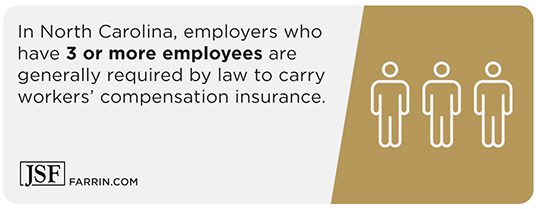People get hurt on the job every day. Maybe it’s happened to you recently. You may be stressed as you face medical bills, an uphill recovery, and uncertainty about your job. If so, you probably have a lot of questions about how to get through this stage of your life – especially if you can’t return to work immediately.
What Is Workers’ Compensation in North Carolina?
Workers’ compensation laws spell out exactly what employers owe to their eligible workers who are injured on the job. Many injured employees do not realize that workers’ comp does not just cover medical bills – it also may include compensation for lost wages.
In North Carolina, workers’ compensation is established by the North Carolina Workers’ Compensation Act and its amendments and governed by the North Carolina Industrial Commission.
Unfortunately, some employers may not follow these laws, and the workers’ comp laws in North Carolina can be complicated. We urge you to seek the advice of an experienced workers’ comp lawyer to help you answer questions you may have after being injured at work.
In this article, I have provided an overview of the major types of workers’ compensation benefits – it’s important to know what benefits may be available to you when you need them most. I’ve also answered some of the most common workers’ comp questions and included plenty of links to other pages in case you want more details on specific workers’ comp topics.
Pay close attention to the warnings throughout the article where I’ve touched on the ways some insurance companies may try to avoid paying for your benefits. It’s important to be aware of these possible threats.
Types of Medical Benefits Covered by Workers’ Compensation Laws (NC)
Medical care prescribed by an approved doctor is 100% covered by workers’ compensation if your workers’ compensation claim has been approved. This is good news! And there are no co-pays or deductibles. Even better news! And you can get paid for travel expenses if you have to drive over 20 miles roundtrip. Great! So, let’s dig a little deeper into workers’ compensation law to understand some of the specifics about the medical benefits to which you may be entitled.
If you’re injured at work, medical care benefits may be paid to you for products and services that are prescribed to help you recover from your injury – treatments focused on curing your injury, lessening your disability, and relieving your pain.
You might guess that benefits can include physical therapy, surgeries, and visits to the doctor. But you might be surprised that workers’ comp may also cover the following:
-
- Travel costs to and from medical appointments (if more than 20 miles roundtrip)
-
- Attendant care (even if a spouse or family member is taking care of you)
-
- Medical equipment
-
- Home or vehicle modifications
Although approved medical benefits are 100% covered by your employer’s workers’ compensation insurance, the insurer has the right to direct your medical care – including choosing which doctor(s) you see. The insurance company also has the option of sending you to a doctor of your choosing for a second opinion, but they rarely do. Instead, they often try to pick a doctor that they think will be helpful to them.
WARNING: Some insurance companies may try to delay or deny your medical treatment. Others may refuse to authorize treatment or send you to a doctor they think will see eye-to-eye with them on your treatment.
You may want to spend some time researching workers’ compensation lawyers in NC if you’re receiving workers’ comp medical benefits and are unhappy with your medical care in any way. My firm will give you a free workers’ comp case evaluation.
Workers’ Comp Will Not Pay You for Pain and Suffering
Physical pain, mental suffering, strains on your finances and personal relationships, and a general sense that life is spinning out of control are often part of the recovery from a work injury. When it comes time to settle your workers’ compensation case, you might think you’ll be paid for the pain and suffering you’ve gone through. Unfortunately, that is incorrect.
Fair or not, workers’ comp NC law doesn’t require insurance companies to pay you for pain and suffering when you are hurt on the job. So, it’s important to try to make sure the insurance company pays you the full benefits the law does require.
As part of the “workers’ compensation bargain,” workers are generally not permitted to sue their employer personally (unless the employer intentionally caused the accident) and can, therefore, only receive benefits related to their medical needs and ability to work.
However, if your injuries were the result of a third party, then you might be able to pursue a claim against that party that takes into account the pain and suffering you have suffered because of the accident.
For example, if you are a truck driver and are involved in an accident that was not your fault while working, then you might be able to make a claim with the other driver’s insurance company to cover some medical bills. This claim might include reimbursement for your pain and suffering. And this is in addition to your workers’ compensation claim.
Wage Replacement Benefits Covered by North Carolina Workers’ Compensation Laws
When you’re hurt on the job and are unable to work while you recover, North Carolina law requires that your employer’s insurance company pay your approved weekly wage replacement benefits in addition to your approved medical bills. You may receive wage replacement benefits when:
-
- You have to take time off to rest and recover
-
- You can work some, but not as much, while you’re recovering
-
- Your injuries resulted in permanent damage, but you can still work (at least some)
-
- Your injuries resulted in permanent damage, and you cannot work at all
In general, wage replacement benefits cover two-thirds of an employee’s average weekly wage and are distributed in the form of weekly checks during the workers’ compensation claim and sometimes as a lump sum settlement at the end of the claim.
For example, let’s say you work in construction and make $600 per week on average. But one day, you fall off a ladder, break your leg, and have to stay out of work for a while. Ouch! If your workers’ compensation claim is approved, you may receive $400 per week (which is two-thirds of $600) for the time you’re out of work.
WARNING: Beware of tactics some insurance adjusters may use, such as delaying when they send you checks, sending you less that you are entitled to receive, or improperly calculating your wage replacement benefits.
If you’re receiving wage replacement benefits, you may want to have a North Carolina State Bar Board Certified Specialist in Workers’ Compensation Law look over your case. You can contact our team for a free case evaluation.
Wage replacement benefits can be divided in two ways – benefits for the time you had to take off of work and benefits to make up for wages you might lose in the future.
Benefits for Time You Had to Take Off of Work
This category is fairly straightforward. Continuing with the example above of you breaking your leg at work: If you then had to stay at home and rest for six weeks per the doctor’s orders, you would likely receive benefits for the six weeks you were unable to work.
Benefits for time off of work might also include trips to the doctor, time out for physical therapy, working fewer hours or less strenuous jobs that pay less, etc. The workers’ compensation benefits in this category are Temporary Total Disability (TTD) and Temporary Partial Disability (TPD).
Benefits to Make Up for Wages You Might Lose in the Future
This category of wage replacement benefits can be a bit more complicated. If your work injuries leave permanent damage that may make your job difficult in the future or may prevent you from being able to return to work, you may be eligible for benefits in this category.
For example, let’s say instead of breaking your leg, you fall off a roof at work and hurt your back. And after it’s healed as much as possible (or you have reached “maximum medical improvement” – or MMI – in workers’ comp terms), you cannot stand on your feet for long periods of time as is required of your construction job.
Once you reach maximum medical improvement, a workers’ compensation attorney can help you negotiate a settlement with the insurance company for any future Temporary Total Disability benefits (TTD) or Permanent Partial Disability (PPD).
PPD is a system where your level of disability is given a Permanent Partial Disability rating from your approved doctor, and your benefits are calculated based on that rating. In cases of some severe injuries, you might be eligible for Total and Permanent Disability, which is when you can no longer work at all.
WARNING: Some insurance companies may try to save money by sending you to a doctor who they think will give an opinion about your disability that is more favorable to the insurance company.
North Carolina workers’ compensation lawyers can’t help you heal faster, but they may be able to push insurance claims adjusters to resolve your workers’ compensation claim more quickly once you have reached MMI and help you set up medical treatment in the meantime to try to help lessen your financial burdens.
Other Types of Workers’ Compensation Benefits
In addition to the two major categories of workers’ compensation benefits, medical benefits and wage replacement benefits, you may also be eligible for:
-
- Vocational rehabilitation, which pays for resume help, job placement services, and educational assistance, if you need to switch careers due to your injury
-
- Death benefits, which pay for funeral expenses and wage replacement benefits, if your spouse or parent (if you’re a minor) died while working
Read Next: The Different Types of Workers’ Compensation Benefits
Does Workers’ Comp Cover Long-Term Health Conditions Caused by the Job?
North Carolina workers’ comp law may provide coverage for people who have suffered a long-term health condition as a result of their work. Qualifying conditions can be caused by an injury that resulted from the job or exposure to harmful chemicals or conditions on the job.
The law determining whether a person is entitled to workers’ compensation benefits for a health condition believed to be caused by working is fairly complex. Essentially, you must show that your work caused the specific condition and that your job placed you at a higher risk for that condition than the general population.
For example, Black Lung Disease is generally caused by exposure to coal dust, so workers in coal mines are at higher risk of developing Black Lung Disease. Coal workers who developed this illness would likely be entitled to workers’ compensation benefits in North Carolina. Another example includes industrial workers who developed the deadly cancer mesothelioma as a result of exposure to asbestos.
What Kinds of Workers’ Compensation Settlements Are There in North Carolina?
Because lawsuits are largely avoided thanks to workers’ compensation law, the successful resolution of most claims happens as a settlement. All settlements are not created equal, however, and if you’ve been hurt on the job, the difference is very important.
Form settlements are agreements based on three factors. Your Employee Compensation Rate, which is 2/3 of Average Weekly Wage, the permanent partial disability (or PPD) rating assigned by your physician, and the part of you that’s injured. In these types of settlements, you’d almost certainly remain employed, and the insurance company would be required to fund medical treatment for your specific workplace injury for a specific period of time as defined in the form itself.
While this type of settlement seems straightforward, know that there is a great deal of negotiation involved to get one, and it depends on many factors that may be judgment calls. Remember: the insurance company appoints the physician. Disputes can arise. Never sign a settlement of any kind without having an experienced workers’ compensation attorney review it first.
Lump sum or “clincher” settlements are trickier. They’re designed to end the insurance company’s responsibility and duty to compensate you for any future care you may need. These are so-called “full and final” settlements – once it’s signed, you’re not entitled to more, even if your injury lingers.
Before you seek or agree to a clincher settlement, remember that most insurance companies want to reduce their costs first and foremost. So, when they offer or even agree to a lump sum, they almost certainly believe that it is the cheaper option in the long run.
Now, the lump sum option may be exactly what you need – or think you need. There are advantages, of course, not least of which is timing – you and your family have needs, bills to pay, and so on. However, if you take a clincher settlement, you’re almost certainly not keeping your job or your employer-provided health insurance if you have it.
I’ve said it before, but it bears repeating. Please consider having a workers’ compensation attorney review any settlement agreement before you sign it – once you’ve signed, your workers’ comp claim is resolved.
Who Is Required to Provide Workers’ Compensation Insurance in North Carolina?
In North Carolina, most employers who have three or more employees are required by the Workers’ Compensation Act to carry workers’ comp insurance. This no-fault insurance can provide workers with medical treatment benefits and wage replacement benefits when they get hurt at work, and it generally protects employers from being sued by injured workers.
Who Can Be Excluded From Workers’ Compensation in North Carolina?
We’ve covered what businesses are required to carry workers’ compensation insurance, but it may be easier to understand who generally isn’t included in workers’ compensation in North Carolina. The list is short, but fairly specific:
-
- “Casual” employees – people who don’t work regular hours and aren’t part of regular business, like paid volunteers
-
- Domestic, “household” employees – people who are employed in a household, such as a private nanny, maid, and so on
-
- Farm workers – if a farm has fewer than 10 employees
-
- Federal government employees – they have their own system in effect
-
- Railroad employees – they have their own system in effect
-
- Corporate officers – people who opt out of workers’ comp coverage (though they still generally count as employees when determining if a business must have workers’ comp insurance under the three-employee rule)









